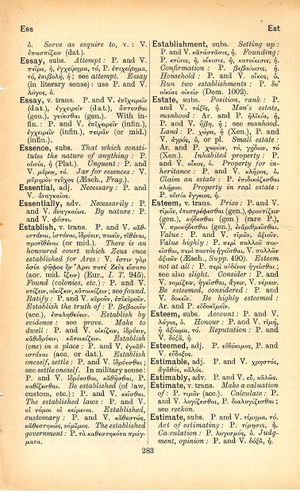establish
Εὐφήμει, ὦ ἄνθρωπε· ἁσμενέστατα μέντοι αὐτὸ ἀπέφυγον, ὥσπερ λυττῶντά τινα καὶ ἄγριον δεσπότην ἀποδράς → Hush, man, most gladly have I escaped this thing you talk of, as if I had run away from a raging and savage beast of a master
English > Greek (Woodhouse)
verb transitive
P. and V. καθιστάναι, ἱστάναι, ἱδρύειν, ποιεῖν, τιθέναι, προτιθέναι (or mid.).
there is an honoured court which Zeus once established for Ares: V. ἔστιν γὰρ ὁσία ψῆφος ἣν Ἄρει ποτέ Ζεὺς εἵσατο (aor. mid. ἵζειν) (Eur., I.T. 945).
found (colonies, etc.): P. and V. κτίζειν, οἰκίζειν, κατοικίζειν; see found.
ratify: P. and V. κυροῦν, ἐπικυροῦν.
establish the truth of: P. βεβαιοῦν (acc.), ἐπαληθεύειν.
establish by evidence: see prove.
make to dwell: P. and V. οἰκίζειν, ἱδρύειν, καθιδρύειν, κατοικίζειν.
establish (one) in a place: P. and V. ἐγκαθιστάναι (acc. or dat.).
establish oneself, settle: P. and V. ἱδρύεσθαι; see settle oneself.
in military sense: P. and V. ἱδρύεσθαι, καθῆσθαι, P. καθίζεσθαι.
be established (of law, custom, etc.): P. and V. κεῖσθαι.
the established laws: P. and V. οἱ νόμοι οἱ κείμενοι.
established, customary: P. and V. καθεστώς, καθεστηκώς, νόμιμος.

